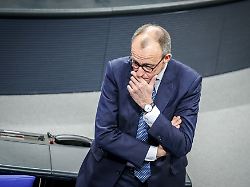New elections in June?
Merz wants to replace Ampel as quickly as possible
December 25, 2023, 8:14 a.m
The dispute over the 2024 budget and the dispute over the traffic light cuts plans continue. CDU chairman Merz sees opportunities for the Union – and is speculating on new elections. But unlike CSU leader Söder, he is particularly skeptical about one party when it comes to the coalition question.
In view of the traffic light coalition’s budget dispute, CDU leader Friedrich Merz is calling for a rapid change to a Union-led federal government. He and CSU leader Markus Söder “agreed that we want to replace this government as quickly as possible,” said the chairman of the largest opposition faction in the Bundestag. If the traffic light fails, an early federal election on June 9th, the day of the European elections, could be considered.
However, the path to an early election is complicated: Among other things, Chancellor Olaf Scholz would have to ask a vote of confidence in parliament and lose. This is currently not foreseeable. With simultaneous elections in the federal government and in Europe, the election to the European Parliament could also be strengthened through high participation, said Merz. In Germany, European elections are considered a reminder election. It is feared that the AfD could do particularly well in 2024. Some hope that high voter turnout could prevent this.
Merz responded to the question of whether the CDU could even organize a federal election campaign by June: “That would be challenging.” Because of the European elections, he is already setting up the party headquarters in such a way that the CDU is able to contest this nationwide election. The Adenauerhaus will then be expanded so that the election campaign for the Bundestag can be conducted at the same time.
Merz skeptical about new GroKo
Merz was skeptical about Söder’s push for a new grand coalition. “The question is anyway: Is that even mathematically enough for a coalition with an SPD that continues to marginalize itself,” said Merz. “And to be quite frank: I don’t have the greatest sympathy for it.” He added: “The SPD is now at 14 percent. You can no longer form a grand coalition with a party like that.” At the same time, Merz emphasized: “We are certainly not going into the election with a coalition statement.” The Union is currently polling between 31 and 34 percent.
At the end of November, Bavaria’s Prime Minister Söder brought up the possibility of a new election on June 9, 2024, the day of the European elections, in view of the traffic light government’s budget crisis. At the same time, he rejected a government with the Greens and called a new edition of the grand coalition a conceivable option.
CDU leader Merz now stated as a strategic Union goal: “After the next federal election, we must be strong enough to have at least two options as to who we can then go into government with.” He cited the Hesse election at the beginning of October as an example. The CDU achieved a result of 34.6 percent, “which would also be a good election result for us in the federal government.” Prime Minister Boris Rhein had two alternatives, held intensive discussions with the SPD and the Greens and decided on coalition negotiations with the SPD. “I would like to see a similar situation for us as a Union in the federal election, no matter when it takes place.”
How does the CDU leader feel about the Greens?
When asked whether he had a preference for the Greens in view of his continued sharp criticism of Chancellor Scholz and the Social Democrats, Merz replied: “At the moment there is a certain preference from a human-emotional point of view. But in reality there are still a lot of differences, very big,” he added. “If the Greens continue with this denial of reality, with this loss of reality, then it will be very, very difficult.” But the question must be assessed after the election.
In his home state of North Rhine-Westphalia, the CDU is in government with the Greens, Merz recalled, adding: “At the moment when it comes to co-government, the Greens and Social Democrats become very flexible, very agile, very adaptable.”
With regard to the Union’s former favorite partner, the FDP, Merz said that with poll numbers of four to five percent, the party’s existence was “once again seriously threatened. I regret that, but I can also understand it from the perspective of the voters of this party.”
The way the FDP co-governs the traffic lights – “government and opposition at the same time” – “will not be rewarded in the long term. That’s not possible. The FDP has to make a decision.” If the FDP decides to remain in the traffic light, this is likely to increase its downward trend, said Merz. “I would like it to be different, but I don’t see it as a realistic option at the moment,” he said, referring to previous black-yellow cooperation.
